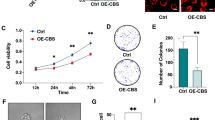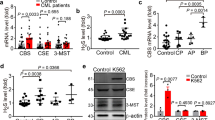Abstract
Recent studies revealed increased expression of various hydrogen sulfide (H2S)-producing enzymes in cancer cells of various tissue types, and new roles of H2S in the pathophysiology of cancer have emerged. This is particularly evident in cancers of the colon and ovaries, where the malignant cells both overexpress cystathionine-β-synthase (CBS) and produce increased amounts of H2S, which enhances tumor growth and spread by (a) stimulating cellular bioenergetics, (b) activating proliferative, migratory, and invasive signaling pathways, and (c) enhancing tumor angiogenesis. Importantly, in preclinical models of these cancers, either pharmacological inhibition or genetic silencing of CBS was shown to be sufficient to suppress cancer cell bioenergetics in vitro, inhibit tumor growth and metastasis in vivo, and enhance the antitumor efficacy of frontline chemotherapeutic agents, providing a strong rationale for the development of CBS-targeted inhibitors as anticancer therapies. However, the observation that inhibition of H2S biosynthesis exerts anticancer effects is contradicted by other studies showing that increasing H2S with exogenous donors also exerts antitumor actions. Herein, we present a brief review of the scientific literature documenting the function of H2S, H2S donors, and transsulfuration enzymes in cancers from various tissue types, and propose that the paradoxical actions of H2S can be resolved by considering the bell-shaped pharmacology of H2S, whereby lower (endogenous) H2S production tends to promote, while higher (generated from exogenously added H2S donors) tends to inhibit cancer cell proliferation. Finally, we suggest areas for future investigations to expand our knowledge of this nascent field.
Access this chapter
Tax calculation will be finalised at checkout
Purchases are for personal use only
Similar content being viewed by others
References
Bhattacharyya S, Saha S, Giri K, Lanza IR, Nair KS, Jennings NB, Rodriguez-Aguayo C, Lopez-Berestein G, Basal E, Weaver AL, Visscher DW, Cliby W, Sood AK, Bhattacharya R, Mukherjee P (2013) Cystathionine beta-synthase (CBS) contributes to advanced ovarian cancer progression and drug resistance. PLoS One 8:e79167
Bohanon FJ, Mrazek AA, Porro JL, Spratt H, Hellmich MR, Chao C (2014) Aminooxyacetic acid in combination with oxaliplatin significantly decreases colorectal liver metastasis in vivo. J Am Coll Surg 219(Suppl):S132
De Vos J, Thykjaer T, Tarte K, Ensslen M, Raynaud P, Requirand G, Pellet F, Pantesco V, Rème T, Jourdan M, Rossi JF, Ørntoft T, Klein B (2002) Comparison of gene expression profiling between malignant and normal plasma cells with oligonucleotide arrays. Oncogene 21:6848–6857
Fan K, Lin N, Qi J, Yin P, Zhao C, Wang L, Li Z, Zha X (2014) Cell Signal 26(12):2801–2808
Guo H, Gai JW, Wang Y, Jin HF, Du JB, Jin J (2012) Characterization of hydrogen sulfide and its synthases, cystathionine β-synthase and cystathionine γ-lyase, in human prostatic tissue and cells. Urology 79:483.e1–483.e5
Hansel DE, Rahman A, Hidalgo M, Thuluvath PJ, Lillemoe KD, Shulick R, Ku JL, Park JG, Miyazaki K, Ashfaq R, Wistuba II, Varma R, Hawthorne L, Geradts J, Argani P, Maitra A (2003) Identification of novel cellular targets in biliary tract cancers using global gene expression technology. Am J Pathol 163:217–229
Hellmich MR, Coletta C, Chao C, Szabo C (2015) The therapeutic potential of cystathionine β-synthetase/hydrogen sulfide inhibition in cancer. Antioxid Redox Signal 87(2):142–149
Kimura H (2011) Hydrogen sulfide: its production, release and functions. Amino Acids 41:113–121
Kolluru GK, Shen X, Bir SC, Kevil CG (2013) Hydrogen sulfide chemical biology: pathophysiological roles and detection. Nitric Oxide 35:5–20
Módis K, Bos EM, Calzia E, van Goor H, Coletta C, Papapetropoulos A, Hellmich MR, Radermacher P, Bouillaud F, Szabo C (2014a) Regulation of mitochondrial bioenergetic function by hydrogen sulfide. Part II. Pathophysiological and therapeutic aspects. Br J Pharmacol 171:2123–2146
Módis K, Coletta C, Asimakopoulou A, Szczesny B, Chao C, Papapetropoulos A, Hellmich MR, Szabo C (2014b) Effect of S-adenosyl-L-methionine (SAM), an allosteric activator of cystathionine-β-synthase (CBS) on colorectal cancer cell proliferation and bioenergetics in vitro. Nitric Oxide 41:146–156
Mustafa AK, Gadalla MM, Sen N, Kim S, Mu W, Gazi SK, Barrow RK, Yang G, Wang R, Snyder SH (2009) H2S signals through protein S-sulfhydration. Sci Signal 2:ra72
Panza E, De Cicco P, Armogida C, Scognamiglio G, Gigantino V, Botti G, Germano D, Napolitano M, Papapetropoulos A, Bucci M, Cirino G, Ianaro A (2015) Role of the cystathionine γ lyase/hydrogen sulfide pathway in human melanoma progression. Pigment Cell Melanoma Res 28(1):61–72
Szabo C (2007) Hydrogen sulphide and its therapeutic potential. Nat Rev Drug Discov 6:917–935
Szabo C, Hellmich MR (2013) Endogenously produced hydrogen sulfide supports tumor cell growth and proliferation. Cell Cycle 12:2915–2916
Szabo C, Papapetropoulos A (2011) Hydrogen sulphide and angiogenesis: mechanisms and applications. Br J Pharmacol 164:853–865
Szabo C, Coletta C, Chao C, Módis K, Szczesny B, Papapetropoulos A, Hellmich MR (2013) Tumor-derived hydrogen sulfide, produced by cystathionine-β-synthase, stimulates bioenergetics, cell proliferation, and angiogenesis in colon cancer. Proc Natl Acad Sci U S A 110:12474–12479
Szabo C, Ransy C, Módis K, Andriamihaja M, Murghes B, Coletta C, Olah G, Yanagi K, Bouillaud F (2014) Regulation of mitochondrial bioenergetic function by hydrogen sulfide. Part I. Biochemical and physiological mechanisms. Br J Pharmacol 171:2099–2122
Takano N, Sarfraz Y, Gilkes DM, Chaturvedi P, Xiang L, Suematsu M, Zagzag D, Semenza GL (2014) Decreased expression of cystathionine β-synthase promotes glioma tumorigenesis. Mol Cancer Res 12:1398–1406
Teng H, Wu B, Zhao K, Yang G, Wu L, Wang R (2013) Oxygen-sensitive mitochondrial accumulation of cystathionine β-synthase mediated by Lon protease. Proc Natl Acad Sci U S A 110:12679–12684
Wang R (2012) Physiological implications of hydrogen sulfide: a whiff exploration that blossomed. Physiol Rev 92:791–896
Wang MJ, Cai WJ, Zhu YC (2010) Mechanisms of angiogenesis: role of hydrogen sulphide. Clin Exp Pharmacol Physiol 37:764–771
Whiteman M, Le Trionnaire S, Chopra M, Fox B, Whatmore J (2011) Emerging role of hydrogen sulfide in health and disease: critical appraisal of biomarkers and pharmacological tools. Clin Sci (Lond) 121:459–488
Zhang W, Braun A, Bauman Z, Olteanu H, Madzelan P, Banerjee R (2005) Expression profiling of homocysteine junction enzymes in the NCI60 panel of human cancer cell lines. Cancer Res 65:1554–1560
Acknowledgments
The work is supported by the National Institutes of Health (R01 CA175803) and the Institute for Translational Sciences at the University of Texas Medical Branch, and Clinical and Translational Science Award (8UL1TR000071).
Conflict of Interest Disclosure Statement
M.R.H. and C.S. have stock ownership in CBS Therapeutic Inc., a for-profit organization involved in the development of CBS inhibitor therapies for cancer.
Author information
Authors and Affiliations
Corresponding author
Editor information
Editors and Affiliations
Rights and permissions
Copyright information
© 2015 Springer International Publishing Switzerland
About this chapter
Cite this chapter
Hellmich, M.R., Szabo, C. (2015). Hydrogen Sulfide and Cancer. In: Moore, P., Whiteman, M. (eds) Chemistry, Biochemistry and Pharmacology of Hydrogen Sulfide. Handbook of Experimental Pharmacology, vol 230. Springer, Cham. https://doi.org/10.1007/978-3-319-18144-8_12
Download citation
DOI: https://doi.org/10.1007/978-3-319-18144-8_12
Publisher Name: Springer, Cham
Print ISBN: 978-3-319-18143-1
Online ISBN: 978-3-319-18144-8
eBook Packages: Biomedical and Life SciencesBiomedical and Life Sciences (R0)




